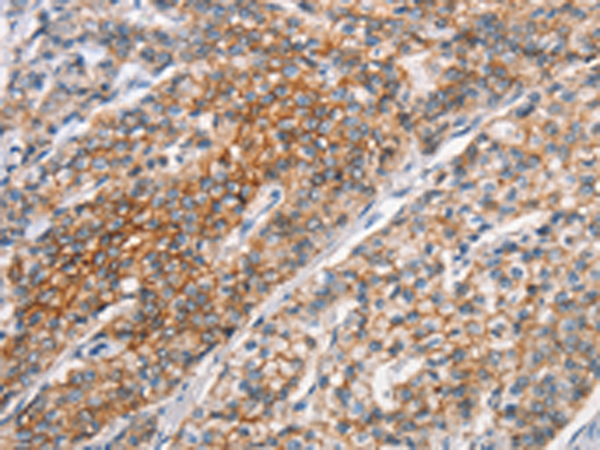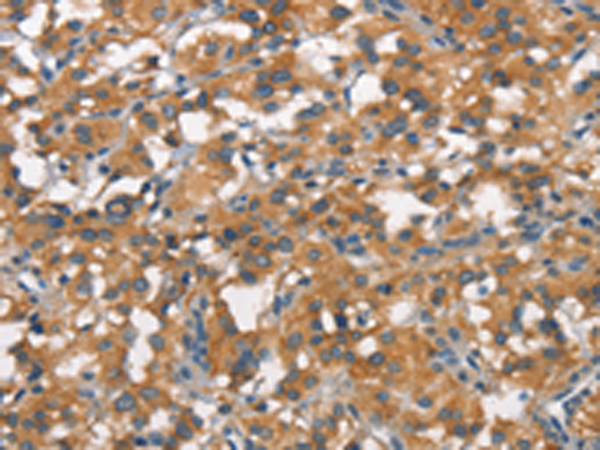


| WB | 咨询技术 | Human,Mouse,Rat |
| IF | 咨询技术 | Human,Mouse,Rat |
| IHC | 1/25-1/100 | Human,Mouse,Rat |
| ICC | 技术咨询 | Human,Mouse,Rat |
| FCM | 咨询技术 | Human,Mouse,Rat |
| Elisa | 1/1000-1/2000 | Human,Mouse,Rat |
| Aliases | MEMD; CD166 |
| WB Predicted band size | 65 kDa |
| Host/Isotype | Rabbit IgG |
| Antibody Type | Primary antibody |
| Storage | Store at 4°C short term. Aliquot and store at -20°C long term. Avoid freeze/thaw cycles. |
| Species Reactivity | Human, Mouse, Rat |
| Immunogen | Synthetic peptide of human ALCAM |
| Formulation | Purified antibody in PBS with 0.05% sodium azide and 50% glycerol. |
+ +
以下是关于ALCAM抗体的3篇代表性文献,包含标题、作者及摘要概要:
---
1. **标题**:*ALCAM/CD166: A pleiotropic mediator of cell adhesion, stemness, and cancer progression*
**作者**:Swart GW et al.
**摘要**:综述了ALCAM在细胞黏附、干细胞调控及肿瘤转移中的作用,探讨了ALCAM抗体在阻断肿瘤侵袭性及作为诊断标志物的潜力,强调其通过抑制ALCAM介导的细胞间信号通路抑制癌细胞迁移。
---
2. **标题**:*Development of a novel anti-ALCAM antibody for targeted immunotherapy in acute myeloid leukemia*
**作者**:Khan A, Smith BD.
**摘要**:研究团队开发了一种高特异性人源化ALCAM单克隆抗体,通过体外和动物模型验证其靶向急性髓系白血病细胞的能力,结果显示抗体可显著诱导癌细胞凋亡并增强化疗药物敏感性。
---
3. **标题**:*ALCAM as a marker for circulating tumor cells in metastatic breast cancer*
**作者**:Lin HK, Alix-Panabières C.
**摘要**:该研究评估ALCAM抗体在富集乳腺癌循环肿瘤细胞(CTCs)中的应用,证实其高敏感性和特异性,并发现ALCAM阳性CTCs数量与患者预后显著相关,提示其作为液体活检工具的临床价值。
---
**备注**:文献年份未标注,建议通过PubMed或Google Scholar输入标题查询具体发表信息。如需实验抗体产品文献,可补充说明研究方向(如免疫治疗、流式检测等)。
**Background of ALCAM Antibodies**
ALCAM (Activated Leukocyte Cell Adhesion Molecule), also known as CD166. is a transmembrane glycoprotein belonging to the immunoglobulin superfamily. It plays critical roles in cell-cell adhesion, immune response modulation, and cellular migration by mediating homophilic (ALCAM-ALCAM) and heterophilic (e.g., ALCAM-CD6) interactions. ALCAM is widely expressed in various tissues, including immune cells, endothelial cells, and epithelial cells, and is implicated in processes such as embryonic development, neuronal outgrowth, and cancer metastasis.
ALCAM antibodies are essential tools for studying its biological functions and pathological roles. In research, they are used to detect ALCAM expression in tissues or cell lines via techniques like immunohistochemistry, flow cytometry, and Western blotting. Dysregulated ALCAM expression has been linked to cancer progression, inflammation, and neurodegenerative diseases. For instance, elevated ALCAM levels in tumors are associated with enhanced metastasis and poor prognosis, making it a potential biomarker and therapeutic target.
Therapeutic ALCAM-targeting antibodies are under exploration to block pathological interactions in cancer or autoimmune disorders. Additionally, diagnostic applications leverage ALCAM antibodies to identify disease-specific expression patterns. Challenges remain in understanding context-dependent roles, as ALCAM may exhibit both tumor-promoting and suppressive effects depending on the microenvironment. Ongoing research aims to clarify these mechanisms and advance translational applications.
×